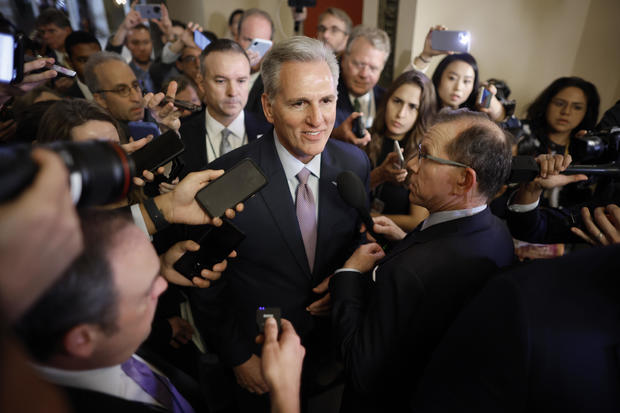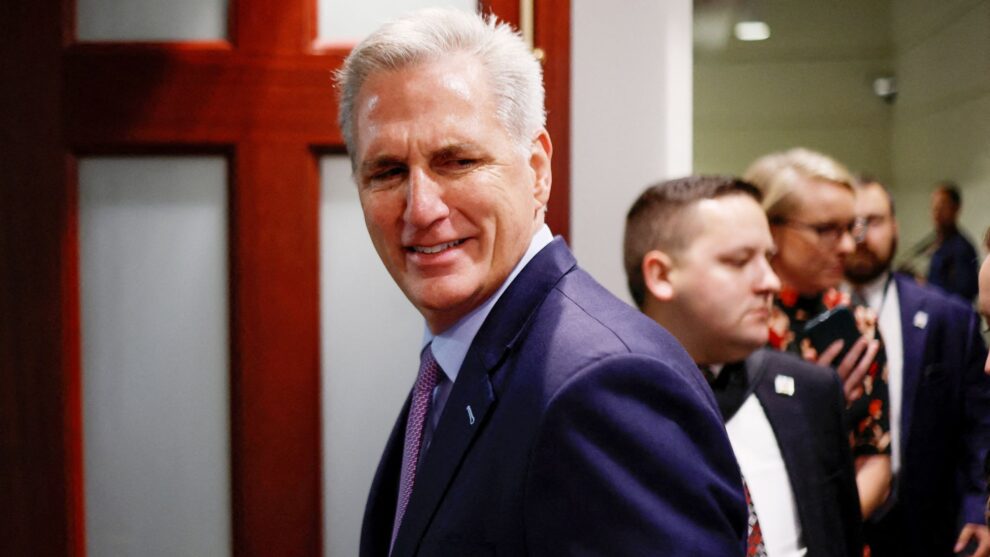Washington — House Speaker Kevin McCarthy was ousted from his leadership position in a historic vote on Tuesday after a far-right revolt over his reliance on Democrats to pass funding to avert a government shutdown.
The final vote was 216-210, with eight Republicans joining all the Democrats to vote to remove McCarthy. It’s the first time a House speaker has been removed in a no-confidence vote.
“The office of speaker of the House of the United States House of Representatives is hereby declared vacant,” said Republican Rep. Steve Womack of Arkansas, who was presiding over the chamber.
Rep. Patrick McHenry of North Carolina, a top ally of McCarthy’s and a member of the Financial Services Committee, was then appointed speaker pro tempore. The rules of the 118th Congress state that “in the case of a vacancy in the office of speaker, the next member” named on a list submitted by McCarthy to the clerk of the House in January will become speaker pro tempore until a speaker is elected.

House Republicans met Tuesday night as a conference to discuss their next steps. McCarthy told his colleagues he would not run for speaker again.
“The reason Kevin McCarthy went down today is because nobody trusts Kevin McCarthy,” Rep. Matt Gaetz of Florida told reporters after the vote. “Kevin McCarthy has made multiple contradictory promises, and when they all came due, he lost votes of people who maybe don’t even ideologically agree with me on everything.”
“This represents the ripping off of the Band-Aid and that’s what we need to do to get back on track,” the Florida Republican added.
Along with Gaetz, seven Republican members voted to oust McCarthy: Reps. Andy Biggs of Arizona, Ken Buck of Colorado, Tim Burchett of Tennessee, Eli Crane of Arizona, Bob Good of Virginia, Nancy Mace of South Carolina and Matt Rosendale of Montana.
A day earlier, Gaetz accused McCarthy of making a “secret side deal” with President Biden on Ukraine aid to get a short-term funding bill passed hours before the government was set to shutdown. The California Republican denied having made any deal in exchange for Democratic votes.
Eleven Republicans voted against the earlier motion to table Gaetz’s resolution, an ominous sign of what was to come for McCarthy.
The speaker of the House is not only the leader of the chamber but also second in line for the presidency. Ousting a sitting speaker by vote in the middle of a congressional term is unprecedented in American history, and McCarthy’s allies warned that doing so would set a precedent that would hang over every speaker moving forward. That argument did not persuade Democrats to come to McCarthy’s rescue.
“We’re in uncharted territory. We’ve never had this situation before,” Matthew Green, a politics professor at Catholic University, told CBS News.
Green said the vote shows the Republican Party has “too many members who don’t like McCarthy personally or otherwise are disdainful of party norms.”
“There was a norm that you don’t do this. This rule has been on the books more or less continuously since 1910,” Green said. “You’ve got a party that’s very small and you’ve got a faction of members who are disdainful of these norms, and that makes it extremely difficult to govern.”
Democratic leadership members had urged their caucus to vote “yes” on the motion to vacate.
“Given their unwillingness to break from MAGA extremism in an authentic and comprehensive manner, House Democratic leadership will vote yes on the pending Republican Motion to Vacate the Chair,” Democratic Minority Leader Hakeem Jeffries of New York wrote to his caucus.
Up until the vote, McCarthy had expressed confidence to reporters that he would prevail.
“I’m an optimist because I think there’s no point in being anything else,” McCarthy said.

He said earlier that he spoke with Jeffries on Tuesday morning, but when he was asked whether he would have to rely on the votes of Democrats to retain the speakership, he replied, “No, I personally am not.”
At a caucus meeting Tuesday morning, Rep. Pete Aguilar of California played a clip from the speaker’s appearance Sunday on “Face the Nation,” in which he blamed Democrats for nearly shutting down the government. In fact, more Democrats than Republicans voted for the bill to extend government funding for 45 days.
Democratic Rep. Pramila Jayapal of Washington said her party would be unanimous in voting against McCarthy.
“We are following our leader, and we are not saving Kevin McCarthy,” she said.
Gaetz has consistently opposed McCarthy’s speakership, and was among those who helped draw out the process of electing him speaker to a record 15 rounds of voting. To win over far-right Republicans, McCarthy agreed to a condition making it possible for a single member to motion to oust the speaker. That deal has come back to haunt him. McCarthy said Gaetz’s challenge to his speakership is “personal.”
Gaetz said after McCarthy’s ouster that he would require the future speaker to keep the one-person threshold to bring a motion to vacate.
He floated House Majority Leader Steve Scalise of Louisiana to be the next speaker, telling reporters he would make a “phenomenal speaker.”
“The best way to advance the conservative agenda is to move forward with a new speaker,” he said.
Ahead of the GOP conference meeting, Rep. Kelly Armstrong of North Dakota told reporters after the vote that he hoped “Kevin keeps going. I don’t think anybody could do a better job.”
But Gaetz said it’s time for McCarthy to “take a hint.”
“After 15 ballots to become speaker, after eight months of a failed speakership and after removal in this historic manner, I think we should move on and find somebody else,” Gaetz said.
Historical precedent for ousting a speaker
The removal of a speaker of the House is unprecedented.
“Well it’s never happened before. We’ve never had a speaker be ousted through the motion to vacate,” said Casey Burgat, assistant professor and legislative affairs program director at George Washington University.
There have been three resolutions offered since 1910 to declare the speakership vacant, but only one ever received a vote.
In 1910, Republican House Speaker Joe Cannon of Illinois invited a vote on his ouster, which was easily defeated. Cannon remained speaker for another year and lost his seat in the 1912 election.
Republican Rep. Mark Meadows of North Carolina introduced a resolution in 2015 to remove House Speaker John Boehner of Ohio from leadership. But it never received a floor vote because it wasn’t introduced as a privileged resolution, instead being referred to the House Rules Committee. Still, Boehner resigned within two months.
In 2019, Republican Rep. Ralph Abraham of Louisiana introduced a resolution to expel House Speaker Nancy Pelosi of California and declare the Office of the Speaker vacant. The measure was referred to the House Committee on Ethics and the House Committee on Rules.
Source: CBS News











